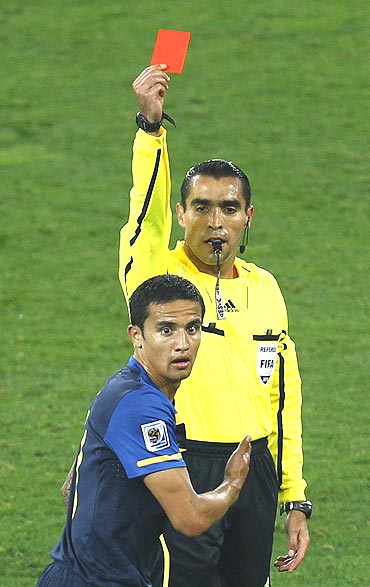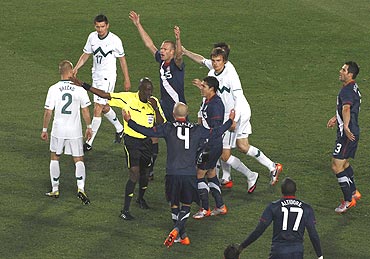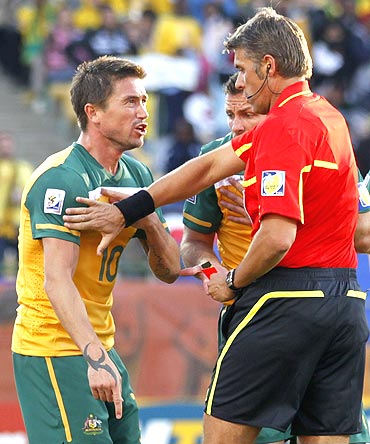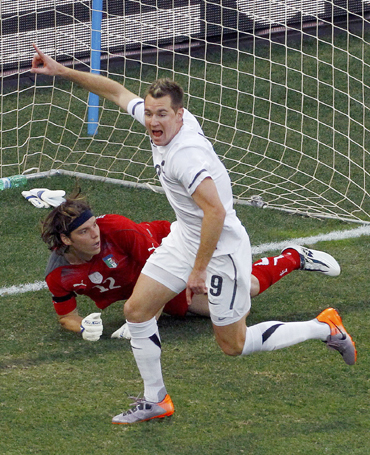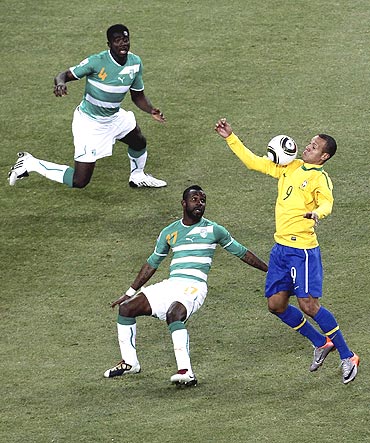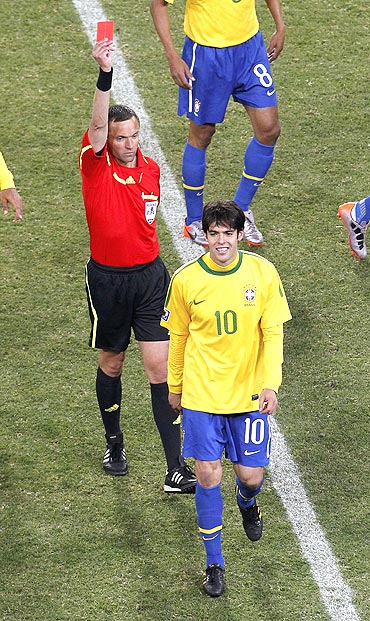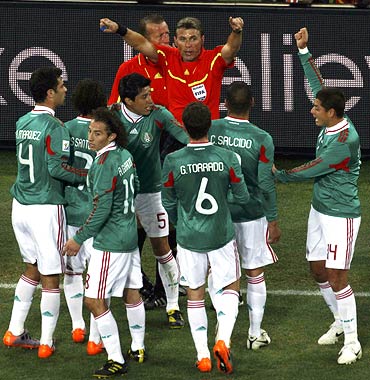 | « Back to article | Print this article |
England face heartbreak over Lampard's disallowed goal
The officiating at the World Cup hasn't been of the highest standard. Technology and replays have only made life tougher for the referees.
Even FIFA chief Sepp Blatter was forced to apologise to England and Mexico for the referee errors that contributed to their World Cup exit. Both teams suffered from refereeing errors in the Round of 16 defeats to Germany and Argentina respectively.
Rediff.com showcases the top-10 disputed calls made by the referees in the tournament so far.
Frank Lampard's disallowed goal against Germany
England were denied an equalising goal when a Frank Lampard shot from 2O metres out hit the crossbar and dropped well over the line, but Uruguayan referee Jorge Larrionda waved play on.
The controversial decision came late in the first-half with the score reading 2-1.
"It was the most important part of the game," England coach Fabio Capello later said of the decision.
"We made some mistakes and the referee made one big mistake but Germany played a good game. Little things decide the result of these matches always. We played well up to 2-1 but after the third goal we were disappointed."
- Germany beat England 4-1 to advance to the quarter-finals.
Compiled by: Norma Godinho
Ref sees red over Cahill's challenge
Tim Cahill's red card
Australia's Tim Cahill was wrongly dismissed for a foul on Germany's Bastian Schweinsteiger in their opening Group D encounter.
Cahill clattered into the German midfielder in the 56th minute of the match, staring in disbelief as Mexican referee Marco Rodriguez brandished the red card.
"It was a devastating blow to me and my career," he told reporters later at a press conference, holding back the tears.
"I think I merited a yellow card, the referee's decision was too harsh.
"Schweinsteiger made a meal of the incident. That's why the referee issued a red card. I can understand him. It was to their advantage. That's football," he added.
Klose becomes victim against Serbia
Miroslav Klose's red card
After thrashing Australia in the opening encounter, Germany looked like they'd go for the kill against Serbia.
With a heavy dose of youth and a sprinkle of experience, the Germans looked the better of the two on the day.
Thomas Mueller and Miroslav Klose always looked threatening for Germany but the latter's frustrations mounted after he missed chances and had a goal ruled out for offside on the half-hour mark.
But the game was turned upside down seven minutes later when the German forward was given marching orders by referee Alberto Undiano after receiving a second booking for bringing down Milos Krasic.
The referee's decision was questioned by the players and media alike. But that didn't seem to have dented Klose's confidence, considering that the Polish-born German has found the back of the net three times, since that fateful day, to help Germany cruise into the semi-finals.
Referee denies American Edu match-winning goal
Maurice Edu's disallowed goal
The US nearly beat Slovenia five minutes from the end when a Landon Donavon free-kick was swung into the Slovenia area and Maurice Edu directed the ball into the net.
But referee Alberto Undiano blew for an infringement and the goal was disallowed.
- The Group C encounter ended in a dramatic 2-2 draw.
Kewell sent off for blocking Ghana goal
Harry Kewell's red card
It was a match that Australia played with immense spirit and grit. They started well against Ghana and led as early as the 11th minute through a Brett Holman strike.
But their hopes of victory were wrecked when they were reduced to ten men.
Australian forward Harry Kewell was sent off by Italian referee Roberto Rossetti 13 minutes later for stopping a goal-bound shot by Jonathan Mensah on the line with his upper right arm.
Asamoah Gyan waited while Kewell argued and gesticulated his way off the field -- he was finally escorted up the tunnel to the dressing room by FIFA officials.
Kewell told reporters after the game that the decision to send him off was harsh.
"Everyone that's seen it is saying 'ok, fair enough, it's a penalty'. But was it deliberate? Of course not, I've never been that way inclined," he said.
Australia coach Pim Verbeek was very critical of the decision and said Kewell shouldn't have been sent off, calling it a hard shot that he couldn't move his arm away from.
"I think it was definitely not a red card," he said. "What can you do with your arm? You can't cut it off."
- The match ended in a 1-1 draw.
Smeltz wrongly awarded goal against Italy
Shane Smeltz's off-side goal
New Zealand took a shock lead in the seventh minute through Shane Smeltz in their second Group F encounter against Italy.
Smeltz, the top-scorer for New Zealand in the qualifiers, poked the ball into the net with his right foot after it was deflected from Italy captain Fabio Connavaro following a high free-kick from wide left by Simon Elliott.
Replays showed that Smeltz was in an off-side position when he converted the Elliott free-kick, but the referee failed to spot it and New Zealand pulled off the biggest upset of the tournament, holding World Champions Italy to a 1-1 draw.
Fabiano does a hand of God -- twice!
Luis Fabiano's handball goal
It was billed as a clash of styles when Brazil faced Ivory Coast in a Group G encounter.
But the match looked drab in the first 45 minutes. An otherwise poor first half only came to life when Luis Fabiano lashed the ball high into the roof of the net past goalkeeper Boubacar Barry.
A smart backheel and a fortunate one-two with Kaka led to the goal.
Twenty-five minutes later, Fabiano showed some nice individual skills, and got the benefit of two dubious handballs for his second goal to put the issue beyond the Ivorians.
"The first goal Brazil scored was very good," Ivory Coast coach Sven-Goran Eriksson said after the game.
"It's difficult to cope with Luis Fabiano and even more difficult if he's allowed to use his hands. Of course, it's handball, not once by twice," the Swede said.
Ref Lannoy fooled by Keita's acting skills
Kaka's red card
Brazil's Kaka was controversially sent off just before the whistle for a second yellow card in the game against Ivory Coast.
His first Brazil dismissal came late in a bad-tempered game after being given a second yellow card for allegedly elbowing Kader Keita, although he was the victim of blatant play-acting by the Ivorian.
"Even my grandmother was angry with the referee," he said. "It was a perfectly normal incident, unfortunately there was just some over-reaction from the other guy.
"If I had really lost my temper, I would apologise. But it was just an ordinary incident."
Estrada clips Torres on the heels, invites refs fury
Marco Estrada's red card
It was Spain's final group match against Chile.
The European champions had to win at all costs to qualify for the last 16. And qualify they did, after beating ten-man Chile in their Group H match.
Chile were reduced to 10 just under 10 minutes before the break.
Iniesta played the ball wide to Villa, ran on to the striker's return pass and slotted clinically beyond Bravo from just inside the penalty area.
As the Spanish players celebrated, Chilean midfielder Marco Estrada, who had already picked up a yellow card, was shown another and dismissed after he appeared to catch Torres's heel off the ball, sending the striker tumbling to the ground.
It didn't look like there was much contact, but the referee saw otherwise and gave Marco Estrada the marching orders.
Tevez gets away with blatant off-side goal
Carlos Tevez's off-side goal
A South American treat was on the cards when Mexico faced Argentina in the Round of 16 clash.
It was an exciting start as Mexico had looked comfortable from the start, pinging the ball around and going close when Carlos Salcido smashed a long-range shot against the bar.
But the Mexicans got rattled after Tevez scored the opener, which was clearly struck from an off-side position.
Tevez opened the scoring after his low effort was blocked by goalkeeper Oscar Perez. Lionel Messi chipped the rebound to his fellow-forward who had strayed into an off-side position and headed the ball into the net.
The Mexicans protested the decision and Italian referee Roberto Rosetti ran over to consult his assistant linesman, who was surrounded by irate players, before confirming the goal. There was a heated exchange between the teams' two benches over the issue after the half-time whistle.
Eventually, the Argentines easily demolished the Mexicans 3-1 at Soccer City to advance to the quarters.

